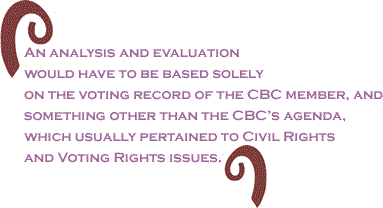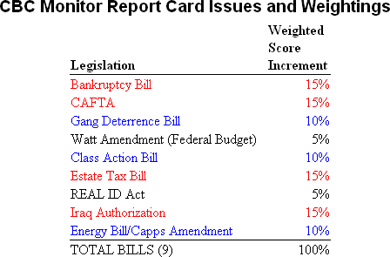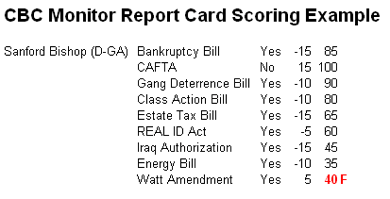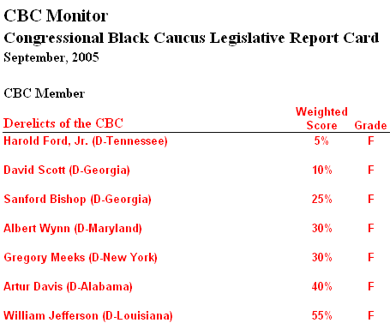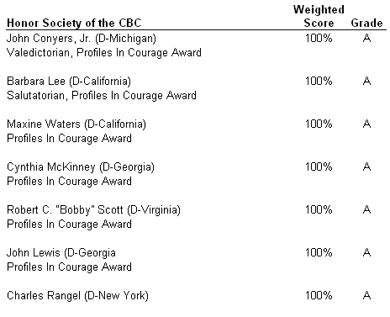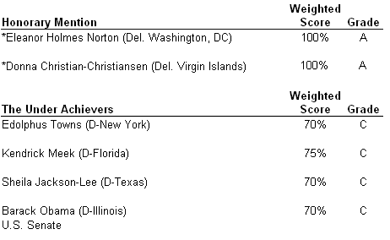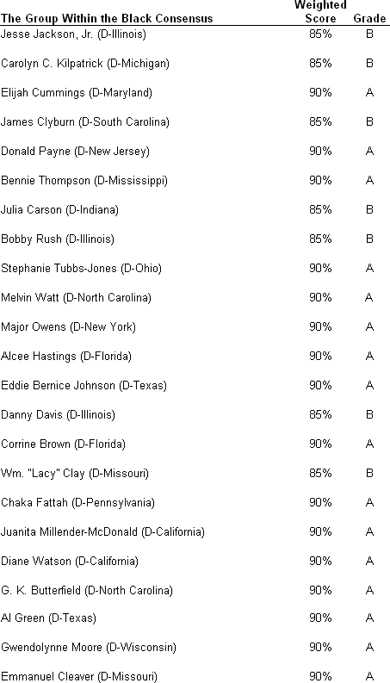
|
|||||||||||||||||||||
 |
|
How to demand accountability on the part of elected officials? It sounds noble enough to the point that many politicians campaign on a platform that promises they will be held accountable by the people who vote for them. Oftentimes, it is just a politically correct word, used to appease the anger of the American public long enough until their attention is distracted by something else more newsworthy. When I relocated to the nation's capitol, I intended to seek out elected officials and ask the question, "Why did they run for public office?" and analyze the responses I thought I would receive. Then, I met a group of politically active professionals, from all walks of life, and of different political affiliations, who had grown alarmed at the representation coming from the Congressional Black Caucus. I met them while having coffee at Café Mawonaj, a local coffee shop frequented by students of Howard University. While sitting among them, I listened to what had them so upset with elected members of the House of Representatives; most notably, the members of the Congressional Black Caucus. As I listened to the dialogue, it became apparent that what had the group upset with the members of the Congressional Black Caucus was the growing trend of at least 25% of the Caucus members who consistently voted against a progressive legislative agenda that would be beneficial to the poor and working class, without fear of reprisal or discipline for breaking party lines, from both the leadership of the Congressional Black Caucus (CBC), or from Minority Leader Nancy Pelosi. This group, known as the CBC Monitor Group, decided that some definitive action needed to be taken, and quickly, in order to send a message to the CBC that the dereliction in their representation of poor communities, would no longer go unheeded. I asked the group how they planned to go about getting the attention of the CBC. The group's founder, Niyi Shomade, responded that "the CBC, especially those who keep crossing party lines, need to be held accountable for their performance as legislators." Mr. Shomade listed a group of bills that passed in the Congress with the assistance of the seven to ten members of the CBC who voted in favor of the legislation. I was invited to join CBC Monitor and accepted by offering to explore and develop a methodology that would put the voting records of the CBC members on public display and then implement a monitoring process to evaluate if the methodology was effective in getting CBC members to pay attention to the constituents they represented. We decided that the amount of members of the CBC (42 House Members and 1 Senator) would be a large enough sample to examine their voting records and be able to manage the information provided to be placed in a comprehensive and brief public report. Developing the Methodology At the next meeting of the CBC Monitor, I suggested
to the members that whatever methodology we used, the data collected
for analysis and evaluation would have to be based solely on
the voting record of the CBC member, and something other than
the CBC's agenda, which usually
Our next step was to look at the legislation that had major significance in the past two years, on which the group believed the CBC ignored the voices of the African-American community. We narrowed down our list to include legislation that we considered "bright-line" issues (read: these were issues that any CBC member familiar with his or her district, would not have voted for because they knew the impact that the passage of such legislation would have on their districts). The following legislation came up for consideration on the floor of the House, beginning in October 2004 to September 2005:
Next, we decided we would gather the voting records of all 42 House Members and the lone Senator, Barack Obama (D-Illinois), and make accurate determinations of how they voted for the legislation we selected. We selected these bills based upon the economic, educational, environmental, mainstream effects they would have upon poor communities, especially African-American communities. Many of the lawmakers represent districts with better than 50% African-Americans residing in their districts, and since the purpose of the Congressional Black Caucus was to make sure, "to promote the public welfare through legislation designed to meet the needs of millions of neglected citizens," our group began to wonder how the Caucus was doing that, when it was discovered that voting for the above listed legislation did the exact opposite. We rationalized that a CBC Member who listened to its' constituency, would vote in accordance with the needs and best representation of said constituency. We also rationalized that a CBC Member would be "in touch" with the African-American Polity in terms of how they cast their votes on the floor of the House. I asked the group if we could use a "grading format" by assimilating all of the votes and assigning a point value for each piece of legislation voted on. We decided to start each member with 100% point value, and the point value would decrease or remain the same, depending on how they voted for each piece of legislation. Since I was tasked to come up with a point value of all nine pieces of legislation to add up to 100%, I asked the group to assign the point value for each piece of legislation, and to assign the point value weight based upon the significance of the legislation. Total points remaining would assign the lawmaker a letter grade, based on the grading scale of A-F (90% - 100% earned an "A"; anything below 60% received a grade of "F"). All of the legislation was considered very significant, but some legislation was considered to have more immediate and egregious effects on the African-American community than others. Therefore, with a unanimous consensus, we came up with the point values assigned as follows:
While we believed the Watt Amendment to the Federal Budget was important, given the demographics of the 109th Congress (read: Republican Majority), it was assumed that Congressman Watt's amendment would not get fair consideration because it called for more funding to social programs that were earmarked for reduction by the then current budget proposal. We also decided that members who were absent from voting, or present, but abstained from voting on these issues, would also lose points. After all, the Representative is, by our vote, expected to speak for his or her constituency with their legislative vote, and unless the member had a seriously important reason for their absence, (i.e. illness - their own, or a family member, or death in the family) being absent for reasons such as off campaigning for higher office, or attending fund-raisers, did not merit being absent from the Floor of the House on such important legislation. Gathering the Data We assigned a team of two people to access Internet resources of Congressional voting records. The most accurate were the ones found at Congress.org and Tech Politics.org. These two websites codified the voting information by Congressional Caucuses per piece of legislation. From that, we were able to produce the following chart for each member of the CBC (I am displaying one for review as an example of how we compiled the votes, the weighted values of each vote and cumulative score):
As the reader can see, this process became a voluminous process for all 43 CBC members that we were unwilling to present to the public until we could streamline or summarize the evaluations and grading charts. Additionally, we were on a deadline to produce the evaluation, named the "CBC Report Card,: in time for the opening day of the CBC's Annual Legislative Conference, which was held in late September 2005.
The reader may be wondering how we evaluated Senator Obama's voting record, given that he is a United States Senator, and not a House Member. It was decided on consensus vote to evaluate him on a higher standard because he sits in a higher level of the Congress, and has responsibility to not only vote on legislative issues, but he is responsible for voting on matters of job placement within the Executive or Judiciary level that requires Senate confirmation. Furthermore, Senator Obama is expected to vote to ratify legislation that would have to be exactly as legislation produced in the House of Representatives, and for those reasons, it was decided his point values would double, because not all the legislation we selected has been debated or passed in the Senate as of this date. So, the point value on legislation that had passed the House, but needed Senate Ratification, was assigned a double point value to Senator Obama. At the time of our analysis, only one piece of legislation, the Tort Reform Bill, was voted upon in the Senate, and Senator Obama was rated accordingly.
The purpose of the evaluation and report card was to highlight the areas where we believed the African-American members of Congress were failing in terms of providing effective representation of their districts. We also wanted to send the message that from this point on, they would be monitored as to how well they would represent the interests of African-American communities that voted them in office, and eliminate any excuse these lawmakers would provide if they were ever challenged on their voting records. Publishing the Results Our group decided that the best time to publish the results and grades of our analysis of the CBC Members' voting records would be during the Congressional Black Caucus Annual Legislative Conference (ALC), where all the members would be present, and we could obtain feedback from people who attend the conference by conducting a poll of the attendees to the Actual Report Card. Our "Report Card" was published in the online Magazine, "The Black Commentator" and was picked up in several news outlets, such as the Commercial Appeal, the Memphis Flyer, The Hill (Congressional Newspaper), Roll Call (Congressional Newspaper) and popular onsite web logs, such as Atrios, DailyKos and The News Blog (Steve Gillard). The following is the Report Card itself:
Comments: The weighted score and overall grades were determined by analysis of individual voting records regarding the following legislative issues that directly have egregious effects on the African-American communities and the districts the Congressional members represent: Bankruptcy Bill Estate Tax Bill Gang Deterrence Bill REAL ID Act Iraq Authorization (2004) Watt Amendment (Federal Budget) Class Action Bill Energy Bill & Capps Amendment CAFTA Vote * denotes non-voting delegate Our group deliberately refrained from analyzing other factors that may have influenced the votes of the lawmakers, such as campaign contributions, aspirations for higher office, affiliations, etc., because we believed those factors were subjective in nature and should be absent of the lawmaker's obligation as an elected representative. We agreed to publish commentaries regarding the lawmakers' affiliations, campaign contributions, and other outside lobbying influences to educate the average voter in future elections, beginning in 2006.
On the opening day of the ALC, there was a "Town Hall" meeting that featured Senator Obama, Senator Hillary Rodham Clinton, Harry Belafonte, Dr. Ben Carson, and other notables. This was one opportunity to distribute hard copies of the Report Card to people attending the Conference, as well as any CBC Member we encountered during the four-day conference. We reproduced and distributed 300 copies of the Report Card, and a team of four individuals attending the conference were given 75 copies of the Report Card for distribution. Each team member was instructed to ask the following questions when passing out the report card, and allowing the individual to read the report card:
We polled an average of 30 people each, who read the Report Card (120 people total). 98% of the people polled thought the Report Card was a good idea towards facilitating accountability, and 75% of those polled stated they would be taking the Report Card to their Representative and informing them that they felt empowered in terms of deciding how they would be voting in 2006. Seventy percent asked that we publish the Report Card more than once a year, and at least 65% of the people polled stated they had Representatives who were CBC Members. Of the 65%, nearly half said that their lawmakers were rated "Under Achiever" or "Derelict," and stated that the Report Card confirmed their suspicions that these lawmakers were not representing their best interests as their elected representatives. We also managed to get the Report Card into the hands of ten CBC members (who confirmed that all 43 members either learned about their grades because they read The Black Commentator, or they received a phone call from a media outlet who picked up the Cover Story from The Black Commentator (the CBC Members listed as "Derelict" complained to the CBC Chairman, Rep. Mel Watt). Of the ten CBC Members we spoke to regarding the Report Card, 70% said they welcomed the scrutiny, even though it made them uncomfortable. They stated they knew that being scrutinized was part of being an elected official, and that their employers were the people who voted for them. Additionally, the 70% stated that having such scrutiny of themselves and their "wayward" colleagues would be helpful in achieving consensus or unanimity on issues such as the Bankruptcy Bill or CAFTA. Thirty percent said they should have been given a "warning" that the Report Card was going to be published, because they felt they were "blindsided" by the publication, and were not ready to respond to their grades.
I gave a copy of the Report Card to CBC Chairman Mel Watt, and his response to it is provided below:
The Black Commentator stated the following from the same article:
The Black Commentator article concluded with the following:
Additionally, Representative Watt informed me that the member rated as "Derelict" should not have been given the ratings they were given, because one was aspiring for higher office (Harold Ford, Jr.) and another's district (Albert Wynn) would not be as affected by the bankruptcy legislation as perceived. He told me these lawmakers had to play to their base, and that our Report Card was "unfair" because we should have based our grades on the CBC's Agenda: The Congressional Black Caucus agenda for the 109th congress:
Upon initial reading of this agenda, we felt the language was vague and indefinable, and we decided to select legislation that would be more direct and articulate, plus it would be defined in the terms of effective representation of their districts, based upon statistical data on an economic, educational, health or environmental scale. Examinations of the CBC's Agenda and compare it to the legislation we selected, demonstrated that Rep. Watt's reaction to the Report Card doesn't have a concrete basis, but suggests an underlying motive, or hidden political agendas regarding certain CBC Members: Additional Methodologies, Research and Investigations Our group has no agenda other than facilitating accountability on the part of African-American Congressional Representatives. We were not sure what the results would be when we published the CBC Report Card. Certainly, we did not expect the hostile reaction that came from almost 30% of the Caucus; nor did we expect that the lawmakers believed they were free from criticism of their performance as lawmakers from other African-Americans. For many days after the publishing of the Report Card, fielding several calls from other political grassroots organizations as to how they could employ a similar methodology, as well as dealing with the hostile reaction from CBC Members (understandably, those who received mediocre to failing grades), we decided that we would do some research that would (a) create additional methodologies for evaluating and assessing the performance of elected officials, and (b) understand the reactions from the elected officials to being evaluated. Every elected official we've seen campaigning has always said that their performance as an elected official is verified by the fact that the voters continue to vote for them, and that their re-election to their positions can be considered a "mandate by the voters." This appears simplistic in nature, but I began to ponder upon the fact that voters aren't often as educated on the political issues as those of us who work in political think tanks, or for political organizations. The CBC Monitor's website is cbcmonitor.voxunion.com |
|
| Home | |
Your comments are always welcome. Visit the Contact Us page to send e-Mail or Feedback or Click here to send e-Mail to [email protected] e-Mail re-print notice
If you send us an e-Mail message we may publish all or part of it, unless you tell us it is not for publication. You may also request that we withhold your name. Thank you very much for your readership. |
|
| December 22 2005 Issue 164 |
||||||||||||||
|
||||||||||||||
|
||||||||||||||
| Printer Friendly Version in Plain Text or PDF format. Download free Adobe Reader. | ||||||||||||||
 |
||||||||||||||
 |
||||||||||||||
| |
||||||||||||||
| |
||||||||||||||























 pertained
to Civil Rights and Voting Rights issues. My argument
was not to focus on those issues because the NAACP evaluated
the CBC members on their legislative records as pertaining to
Civil Rights, and all members, even those considered "derelict"
received grades of "A+" at least, so their evaluation
excluded more mainstream issues that would still have serious
impacts for African-American communities, such as education,
environment, judicial, housing, public health, etc.
pertained
to Civil Rights and Voting Rights issues. My argument
was not to focus on those issues because the NAACP evaluated
the CBC members on their legislative records as pertaining to
Civil Rights, and all members, even those considered "derelict"
received grades of "A+" at least, so their evaluation
excluded more mainstream issues that would still have serious
impacts for African-American communities, such as education,
environment, judicial, housing, public health, etc.